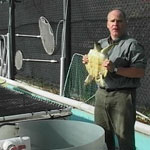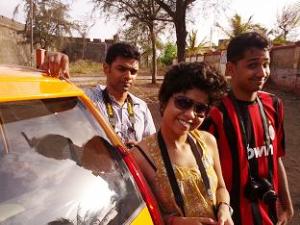Mumbai’s theatre group Swangwale will be selling seeds to school children after every performance of their new play `Rang Rangila Gittu Girgit’. SUMEDHA RAIKAR-MHATRE finds out why and how director-designer Dhanendra Kawade intends to make a case for a greener Earth, and quite literally so
Gittu, a reckless chameleon, protagonist of the soon-to-open Hindi play Rang Rangila Gittu Girgit, one day loses its ability to change its colors. It can no longer camouflage itself in the natural environment, thereby losing its basic tool of survival. Director-playwright Dhanendra Kawade presents Gittu’s story as a metaphor of human contempt for ecological balance. He intends to tell the story to school children in Mumbai and later travel to other parts of India, with his 15-member crew assembled under the provocative name of `Swangwale’ (`swang’ stands for a fascia/facade in Hindi).
Gittu Girgiti's a children’s play, with all adult actors. The target audience is school children, who will be goaded into buying seeds and adopting baby trees. That explains the tie up of the theatre group with the Green Umbrella non-governmental group, which is geared towards activities that combat global warming. The play is therefore a part of a larger drive for plantation of native plant species, which has been started by eco-activist Vikram Yende of the Green Umbrella.
While Gittu Girgit is all about serious themes like bio-diversity, deforestation and the human assault on ecology, it camouflages these macro issues in a story of a chameleon. “We zeroed in on a chameleon because humans, very much like chameleons, change their colors. They adopt duplicitous policies on environment. They speak of preserving greenery and then de-reserve green zones for building malls. The play brings out this irony,”says Kawade, who is currently conducting sensitization workshops for the crew. “In order to engage children, the play has a physicality of movement. Rigorous movements of our actors will bring alive the natural creatures. Only if we make it interesting for the schoolgoing kids, then can we hope to instill the message of preservation.”He says the impact of the play will be measured in a long-term perspective. “Even if five students, in a class of fifty, come to us for buying the seeds (one Rupee per seed), it will be an achievement. We can easily give the seeds for free. But we want the students to make a conscious decision of nurturing the plant thereafter.”
To bring home the ‘green message’, Gittu Girgit’s set design has been recycled out of waste and reusable plastic. Instead of the normal lights, which consume more electric power, the play falls back on LED (light-emitting diode) bulbs that save energy. The costumes have been made out of eco-friendly material. “We are pretty serious about it ourselves. So, we do not use plastic cups for our tea, even in the rehearsals. We carry our glasses with us even during the making of the play!”Incidentally, a suburban school (Pragya Bodhini) has given free rehearsal space to `Swangwale’. The pre-production cost has been borne by the group, in the hope of tapping a network of organizations that will appreciate the ‘green’effort. “We don’t want to make major bucks, but if we break even, then we will have enough money to do more plays all over the country. We are soon writing to schools to offer us their auditorium space for our performance, but we are mentally ready to perform in the open,”says Kawade who has deliberately designed minimalistic (but colorful) props.
Why is a professional theatre group taking on a green cause? “As artists, it is our moral duty to espouse a cause that has a real-life connection. I felt strongly about it when I did quite a few children’s productions (like Harit Kranti). But I wanted something more full-fledged, without sounding academic. It is difficult to arrive at a production that does not merely give ‘gyan’on ecology.
Kawade’s main fear was a play that ends with a sing-song green jingle. “Children’s theatre should not be juvenile. But it should be a smart professional effort. More so when we are alerting children to the perils of human behavior, our vehicle of communication cannot be shoddy or prosaic.”Gittu Girgit has been therefore rewritten and improvised several times, so that it gives an effective but palatable message to people in the impressionable bracket. A 125 minute crisp package at its natural best!
Find us on facebook: facebook.com/TheThumbPrintMag







































